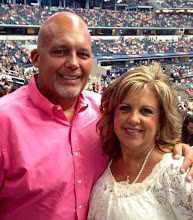As many of you know, I have spent some time in the Cleveland Unit of the Texas State Prison system ministering to the men in the Prisoner Entrepreneurship Program (PEP).
I personally find the time I spend with those men refreshing. On several visits I have listened to men share their "story." There are two themes that run through theses stories. First, in almost every case these men grew up in homes where the father was absent - physically or emotionally. The men in the PEP program did not have a a strong male role figure in their life.
The absence of a father figure is probably related to the second theme. Absent a strong father figure, these boys sought affiliation with individuals and groups who would provide the acceptance and affirmation they weren't getting at home. And they chose the wrong people.
If you were to have asked these guys, "Who are your people?" the answer would not have led to a group of outstanding citizens. And those people had a profound, but negative impact on these young men. The consequences were devastating.
How might their lives have been different if they had an active father and were surrounded with the the right people?
Its easy to see these patterns in the lives of these men. But what about you and me? If we're not careful, we can surround ourselves with the wrong people, the wrong role models. If we're not careful we can have people in our lives that endorse wrong decisions and lead us to justify choices that we otherwise would not have made.
In just about every case of leader derailment that I am aware of, there are poor choices and bad decisions made by the leader. But, they are usually surrounded by people who endorse the behavior. In fact some of these people may even have told the leader they deserved, or were entitled to make the decisions that were made. In the worst cases, the poor decisions were actively supported. In the "best" cases, the people didn't challenge the decision patterns and allowed them to occur.
As followers we should be asking our leaders "Who are your people?" The answer could be telling. Who are the people the leader is surrounding themselves with?
As leaders, we need to evaluate "our people." Are they loyal enough to challenge me when they see me making mistakes or taking steps on a path that will lead to the wrong destination? Are "my people" willing to tell me no when I am wrong?
Who are your people?


No comments:
Post a Comment